Political Economy

Rethinking 1984 and Brave New World
With the rise of Donald Trump, U.S. politics has descended, like never before, into a theater of the absurd. Unbridled anti-intellectualism, deception, and “vindictive chaos” recall a morally reprehensible past in the guise of “making America great again.” But despite his populist posturing, Trump’s contempt for democratic processes is matched by his commitment to economic policies that favor the financial elite. | more…

Capitalism was a radical break with the past: for the first time, production of basic goods was driven by the accumulation of wealth for its own sake, and not primarily to satisfy human needs. Likewise, we are alienated from the natural world, as the products of our own labor are no longer under our control. Our very perception of nature is shaped by an economic system that treats “the environment” as a collection of commodities to be exploited. | more…

The Legacy of Andre Gunder Frank's 'Development of Underdevelopment'
Admired, followed, criticized, denounced, and rediscovered, “The Development of Underdevelopment” deserves a place among the key documents of postwar radical political economy. More than fifty years on, its ideas still illuminate aspects of recent struggles and shortcomings among left-of-center governments in Latin America. Most importantly, Frank’s work poses a bold postcolonial challenge that has yet to be fully met by Latin American scholars and social movements. | more…
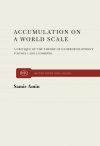
Samir Amin has undertaken an ambitious task: nothing less than an analysis of the process of capital accumulation on a global level. Drawing on a wide range of empirical material from Africa and the Middle East, Amin attempts to demonstrate, through a critique of writings on “underdevelopment,” how accumulation in advanced capitalist countries prevents development, however that may be defined, within the peripheral social formations, usually referred to as “underdeveloped” countries. Samir Amin ranks among those who realize the necessity not merely to comprehend the growing crisis of world capitalism, as it manifests itself within individual nation states, but also at the world level. | more…
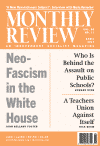
One would think that with such an anti-worker president, the U.S. labor movement would be primed to do all in its power to mobilize union members to resist, much as millions of people have protested Trump since the day he took office. But such has not been the case. | more…
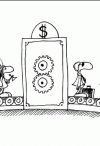
Not only a new administration, but a new ideology has now taken up residence at the White House: neofascism. It resembles in certain ways the classical fascism of Italy and Germany in the 1920s and ’30s, but with historically distinct features specific to the political economy and culture of the United States in the opening decades of the twenty-first century. | more…

While the political conflicts and social ramifications of public school reform are well known, basic questions about the movement remain underexamined. Who really leads it? What are their motives? We need a deeper understanding of this movement, its drivers, and its underlying aims. | more…
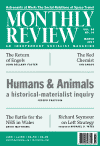
U.S. economic, military, and financial dominance have been ebbing for decades, leaving the United States in the position of a wounded mastodon within the world at large, a threat to all around it. Washington has repeatedly tried with very limited success to reverse this slide in its hegemonic role by means of geopolitical expansion, aimed at increasing its “strategic assets” across the globe. The result has been a constantly expanding theatre of global conflict. | more…
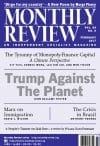
For those attuned to the most fashionable trends in mainstream discourse on climate change, it is clear that “resilience” is now in, and “sustainability” is out.… The concept of resilience, while adopted by some progressive thinkers and organizations, is nonetheless being rapidly incorporated into a survival-of-the-most-resilient philosophy in which poor nations, and indeed exploited and dispossessed people everywhere, are told they must simply become more “resilient” in order to survive—but in a world in which such dynamic adaptability is available mainly to the rich, who enjoy monopolies of capital, resources, and technology. | more…

It would be wrong…to see the new administration as simply a cabal of ignoramuses, beginning with the climate-change-denier-in-chief himself. Rather, their efforts to undermine even modest regulations and to discredit sound science are necessary parts of an attempt by carbon capital to proceed undeterred with burning of fossil fuels, as if this did not constitute a dire threat to the human species.… Today virulent anti-environmentalism, tied to a broader neo-fascist politics linked to white supremacy, is the backfire being ignited against both efforts to combat climate change and the larger movement for social and environmental justice. | more…
Since the 1980s, economic growth in the core capitalist countries has been driven by an enormous expansion of financial capital, accompanied by steady deindustrialization. In recent years, the monopoly power of this financial capital has displayed increasingly tyrannical characteristics: it depends for its continued growth on ever-increasing indebtedness and dependence in developing nations, widening the divide between rich and poor and ultimately fostering state violence that serves to suppress popular resistance.… [Today,] military and monetary strength work together to profit from inequality and instability in emerging economies. | more…

Corruption, Neoliberalism, and the Primary Sector
In discussing the Brazilian situation, it is easy to focus on the dramas of individual politicians and institutions. But to look only at this level of the crisis is to ignore the deeper economic conditions that have driven the country’s politics to the edge.… The deeper contradiction, however, lies with the natural-resource economy, in which government revenue and social spending require royalties that are controlled by a small, unaccountable elite…. The left’s only viable response…is to demand a radical restructuring of the primary sector and a reinvigorated opposition to neoliberalism. | more…










